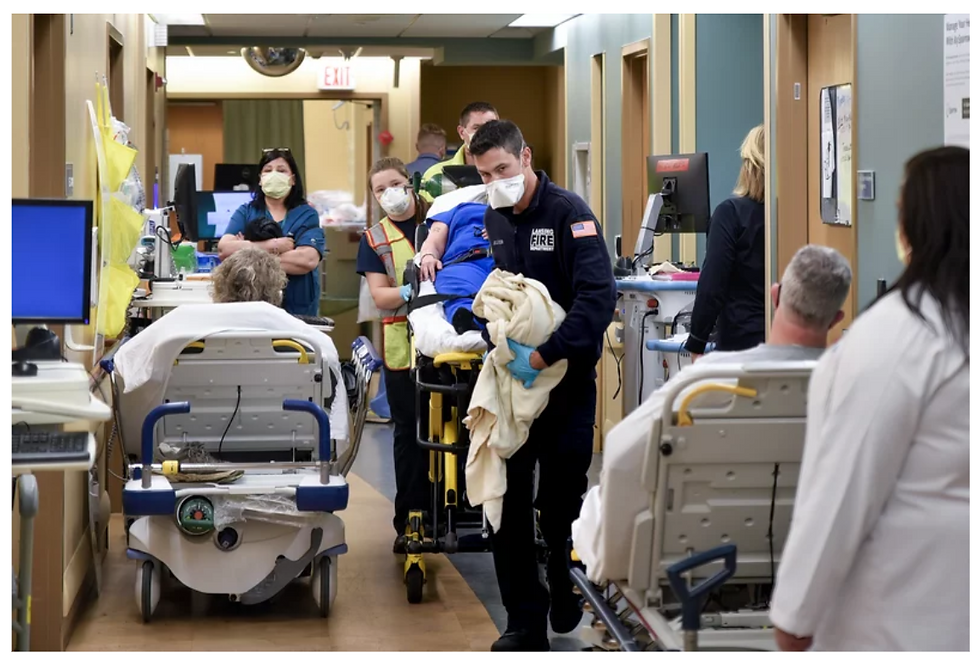Wound Care in Hospital at Home Models- 2022
- katherinepiette
- Feb 16, 2022
- 3 min read
By Joe Ebberwein, Co-Founder and CFO

In the summer of 2021, in our Corstrata blog, No matter what you call it... @Home Models, we reflected on the various models of care that could be delivered in the home. At that time, there were 145 hospitals in 66 systems over 32 states participating in the Centers for Medicare and Medicaid (CMS) waiver program, “Acute Hospital Care at Home.” The shift to innovative models of care continues to gain momentum in the early months of 2022 as evidenced by the number of hospitals participating in the waiver program (as of January 20, 2022, there are 197 hospitals in 90 hospital systems in 34 states) supported by the significant capital being invested in @Home models - $105M invested in ConcertoCare, $110M additional investment in Medically Home, etc. and the consequential number of recent mergers and acquisitions - Signify Health acquires Caravan Health, Thirty Madison and Nurx Combine, etc.
Multiple randomized trials provide solid evidence that Hospital at Home produces positive outcomes, including one highlighted by the Agency for Healthcare Research and Quality (AHRQ) demonstrating:
Shorter length of stay
Lower hospital readmission
Fewer Emergency Department visits
Fewer Skilled Nursing Facility (SNF) admissions
Fewer interventions (including IV fluids, sedatives, urinary catheters, etc.)
Fewer complications (including delirium, bowel complications, etc.)
Better quality of life
Lower costs (The cost per patient day was 32% lower for Hospital at Home patients than for hospital inpatients)
Higher patient satisfaction and lower caregiver stress
As emerging @Home Models target ever more chronic and acute patient conditions, it becomes imperative that Providers take further steps to ensure quality associated with high-risk patients in the home for Skin Health, Wounds, and Ostomies. @Home Models create a key focus on care for vulnerable populations who are at the highest risk for Skin Health complications.
In the U.S., there are seven million persons living with a wound and one million living with an ostomy. Thirty percent of persons cared for in post-acute settings have a wound, yet only ten percent of the already scarce board-certified wound and ostomy nurses practice in post-acute settings. These significant, and often preventable, wounds include pressure injuries, lower extremity vascular wounds, and complex palliative and end-of-life wounds which require the attention of a knowledgeable specialist to produce the optimal clinical outcomes.
How does Corstrata work with Hospital at Home Programs? Corstrata solves many of the issues that hospitals experience regarding wound care in patients identified for admission to Hospital at Home. First, many hospitals are struggling with staffing of registered nurses, including scarce Wound and Ostomy certified nurses who prepare patients with wounds and ostomies for discharge home. Discharges are often delayed because of the lack of access to a WOC Nurse to develop a wound or ostomy care discharge plan with proper patient and family education to care for their condition.
Once the patient is admitted to the Hospital at Home program, it is imperative that the patient-centered plan of care includes the optimal wound care plan utilizing advanced wound dressings to expedite healing. Additionally, it is critical that wound prevention protocols are initiated to prevent pressure injuries which are reportable in outcomes such as “Hospital Acquired Pressure Injuries” (HAPIs) and applicable to Hospital at Home. Inadequate wound care can lead to complications such as infection or sepsis, requiring readmission to the acute care hospital.
As chronic wounds typically require a longer healing time than the current timeframe for an acute Hospital at Home episode of care (4-7 days), having access to wound care expertise such as Corstrata’s board-certified wound nurses assists in the entire episode of care for the patient at home.
Corstrata's role in new @home care delivery models is highlighted in the recent Rowan Report from 2/17/22;
About Corstrata
Our senior-level, wound-certified nursing staff are some of the best and most experienced in the industry. We couple their expertise with the most advanced wound dressing technology, the latest evidence-based research, and our Telehealth infrastructure to ensure that we deliver the right patient support at the greatest point of need – the bedside.
Contact Us to learn more about how Corstrata can assist you with optimizing your @Home program with our board-certified wound and ostomy nurses.




Comments